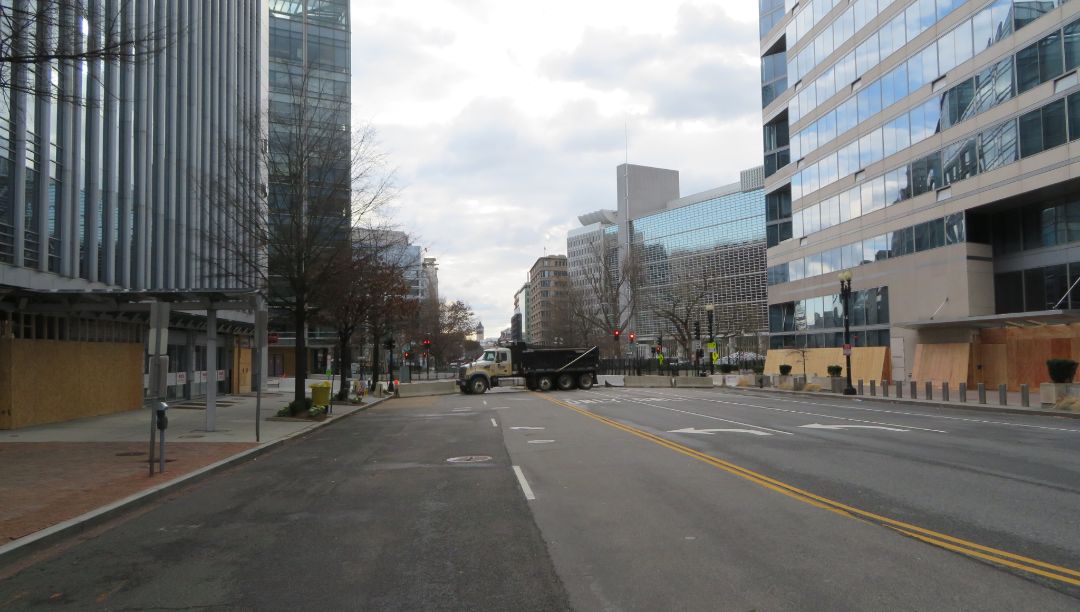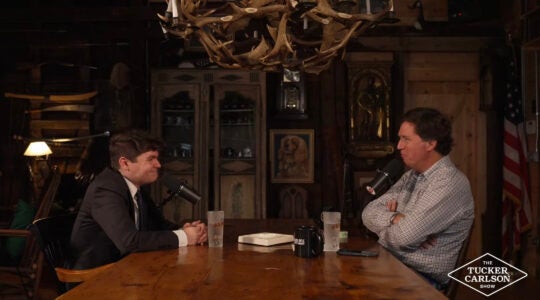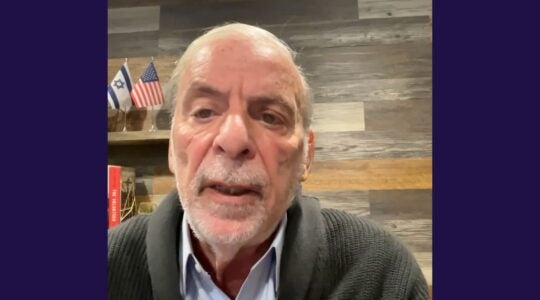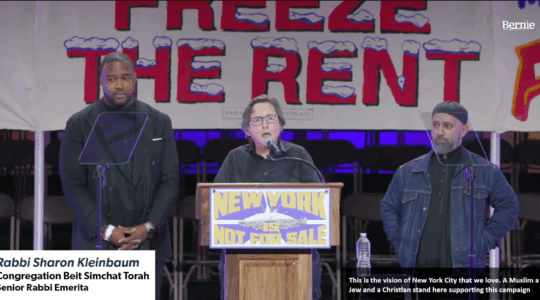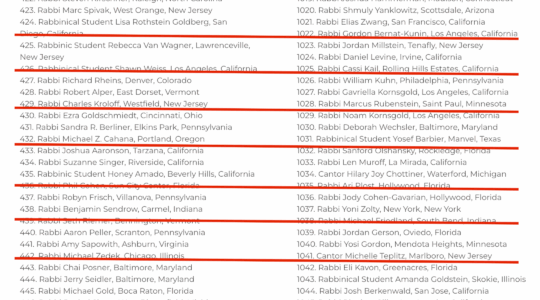WASHINGTON (JTA) — I walked to President Joe Biden’s inauguration.
The Washington Metropolitan Area Transport Authority closed 13 downtown stations Jan. 15-21, so I couldn’t take the Metro to Lafayette Square, where I was headed for a stand built for reporters to watch Joe and Jill Biden walk up the semicircular drive and into the White House.
I didn’t miss taking the Metro, until I did.
Taking the subway to the inaugural festivities in 2001, 2005, 2009, 2013 and 2017, I was carried on a wave of parka-clad humans jammed into cars steamy with excitement. Passengers carried folded banners like barely concealed secrets, eager to explode on cold bright mornings into reds and blues and exclamations of fealty to George W. Bush, then Barack Obama, then Donald Trump.
This time I walked the two miles from Arlington, Virginia, the leafy D.C. suburb where I live — and where the insanity of recent weeks is barely perceptible — into empty downtown Washington transformed during a pandemic and pro-Trump insurrection by checkpoints, boarded windows, armored vehicles and troops.
I crossed over the Potomac River on a bridge named for Francis Scott Key, who wrote the national anthem, and into Georgetown, the village that predates America. Then into the famed K Street corridor, lined with stately buildings and bereft of living beings.
I said “Good morning!” to the few people I encountered, homeless or in uniform. A woman waiting for a bus in Georgetown was my single civilian encounter and the only one who replied.
“It’s a new day!” she said, her eyes smiling above her green mask.
I missed the chance encounters essential to my reporting, especially about Jews. Such unprompted encounters happen even at events as hyper-curated as inaugurals: running into fans of Rabbi Marvin Hier in 2017; overhearing one rabbi in 2013 confess to another that she snuck changes into a speech scripted for her by the National Cathedral to make it “a little Jewier.”
On K Street, I spotted clusters of humans ahead on the corners of 16th and 15th, the streets that lead south toward Pennsylvania Avenue and the White House. They were National Guard and Secret Service troops, journalists and inauguration staffers waiting to cross through security checkpoints. I headed from the checkpoint at 15th Street toward Lafayette Square, where there was another security checkpoint.
I was finally among people, but they were people like myself, observers. There were no celebrants to observe. Instead of the stretch of risers that conventionally line Pennsylvania Avenue for parade watchers, there was only one riser — for journalists.
An anxiety threaded through Biden’s inaugural, combined with what others described as a sense of relief. With a small, socially distanced audience and a Capitol ringed with barbed wire, Biden spoke of unity in the face of hardship. Four years earlier, Trump had talked about “American carnage” at a time of relative prosperity.
Biden’s central theme was repairing the damage wrought by the extremists who felt encouraged by Trump’s words and deeds. He addressed the “political extremism, white supremacy, domestic terrorism that we must confront and we will defeat.”
Biden launched his campaign in part because he was appalled by the anti-Semitism at the deadly white supremacist march in 2017 in Charlottesville, Virginia, and he has noted that he has plenty of Jewish family, including grandchildren. But there was little if any explicit Jewish content in the Biden inauguration — no rabbi delivered remarks, as Hier did at Trump’s inaugural. Biden’s rabbinical blessing came in his home state of Delaware, where a spiritual leader delivered remarks at a farewell ceremony a day before the inauguration. Nor did the new president explicitly call out anti-Semitism, as he did frequently on the campaign trail.
Doug Emhoff made history by becoming the first Jewish spouse of a vice president, Kamala Harris, but he hung back to give his wife the spotlight, and there were no references to his Jewishness during the ceremony.
The explicit Jewish triumphs were marked later, on the Hill. Democrats assumed the leadership in the Senate, and New York’s Chuck Schumer in his maiden speech as the first-ever Jewish majority leader said he felt the “full weight” of his responsibility as the descendant of victims of the Holocaust.
The swearing-in ceremony included the two Georgia senators who got him there: Jon Ossoff, the state’s first Jewish senator, and the Rev. Raphael Warnock, its first Black senator. They each invoked the Black-Jewish alliance during the campaign, and on Wednesday each included the other in the photos they posted on social media. Ossoff said he carried at his swearing-in copies of the ships’ manifests recording his great-grandparents’ arrival at Ellis Island.
There were at least three online Jewish inaugural parties — on Sunday, Tuesday and Wednesday evening — two of them culminating with David Broza singing his classic “Yihiye Tov,” “It will be all right.”
From our perch across from the White House, reporters watched the post-inauguration parade proceed up Pennsylvania Avenue through the cold, bright morning: a parade missing onlookers. I was reminded not of previous inaugurations but of an assignment from an Associated Press editor not long after the 9/11 attacks: Walk down Pennsylvania Avenue and see what’s changed. I researched the street’s history and discovered a tale of the closing of the American landscape.
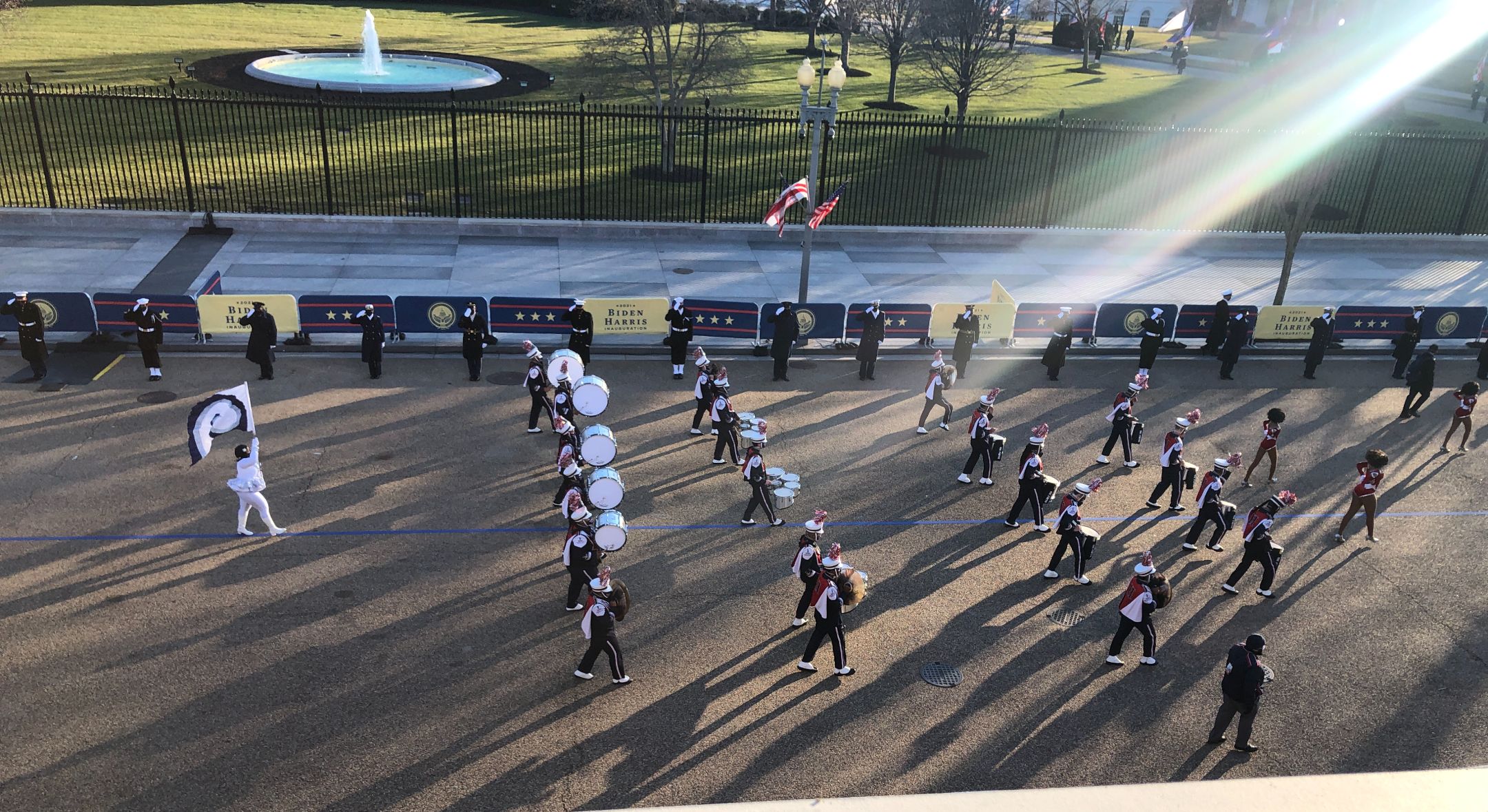
The Howard University marching band performs on Pennsylvania Avenue during Joe Biden’s inauguration parade in Washington, Jan. 20, 2021. Parade watchers were missing because of security and pandemic concerns. (Ron Kampeas)
As recently as the FDR administration, you could walk up and knock on the White House door. The 1983 bombing of Marine barracks in Beirut saw the establishment of the first physical barriers along the route, I learned, and more were added after the 1995 bombing of a federal building in Oklahoma City by a white supremacist. In 2001 there were new restrictions and, walking the route, the only structures I could freely enter were Pennsylvania Avenue’s churches.
On Wednesday, steeples loomed remote and inaccessible. The Bidens and the Harris-Emhoffs waved at no one in particular and walked up the semicircular driveway.
The night of the inauguration, songs of hope featured prominently and echoed the “whistling past the dark” sensibility of much of the affair. Jon Bon Jovi covered “Here Comes the Sun,” Demi Lovato did the same for “Lovely Day,” and Ant Clemons and Justin Timberlake sang “Better Days are Coming.”
It was the Jewish songs, or more precisely verses written by Jews, that acknowledged the anxiety.
“Weeping may endure for a night, but joy cometh in the morning,” Biden said in his inaugural speech, quoting Psalms.
The president then quoted “American Anthem,” a song written for a Ken Burns documentary on World War II by Gene Scheer, a librettist whose specialty is Holocaust-era operas.
“The work and prayers of centuries have brought us to this day,” Biden said. “What shall be our legacy? What will our children say?”
The Biden quote that made headlines was “Democracy has prevailed,” but Scheer’s unanswered questions jelled better with what Biden said leading into that quote: “Democracy is fragile.”
Yolanda Adams sang Leonard Cohen’s “Hallelujah” at the Tuesday night memorial for the 400,000 Americans killed by COVID, and her performance featured again in the Wednesday night celebration. On social media, the quibblers arose who love to note that however ubiquitous the song has become as a prayer, “Hallelujah” is not about hope but erotic longing.
But it’s more than that, too. It’s a song of loss, made clear in the two of its many verses Adams chose: “It’s not a cry that you hear at night, It’s not somebody who’s seen the light, It’s a cold and it’s a broken hallelujah.”
Cohen’s repeated “hallelujah” is not a herald of triumph, it is a mourning for loss, a concession of defeat.
John Legend sang “Feeling Good,” made famous by Nina Simone, the civil rights songstress. It was co-written by Anthony Newley, the British songwriter and singer marginalized by his swinging London peers, according to one account, because they saw him as too over-the-top, too sentimental, too … Jewish.
Newley’s anti-Semitic contemporaries were shallow and callow, no surprise. He wrote a vexing, unsettling song: a soaring celebration of the emergence from darkness counterpointed by descending blues chords that augur the imminent return of darkness.
“It’s a new day,” the woman at the bus stop told me on a morning flooded with cold and sunshine. “I can feel it. It feels good.”
JTA has documented Jewish history in real-time for over a century. Keep our journalism strong by joining us in supporting independent, award-winning reporting.
